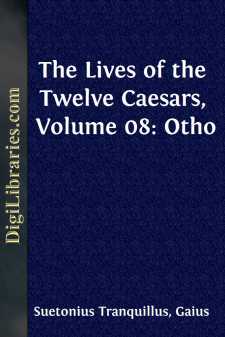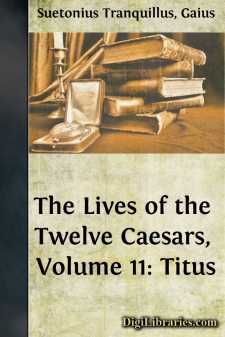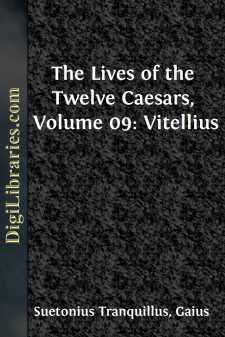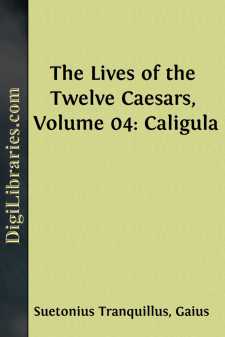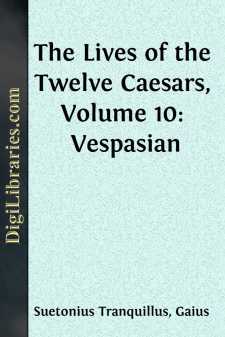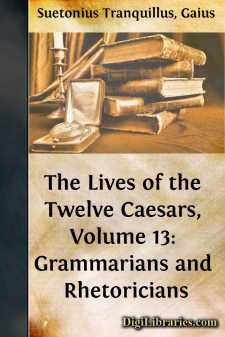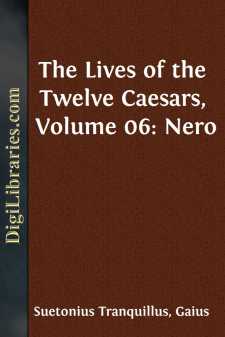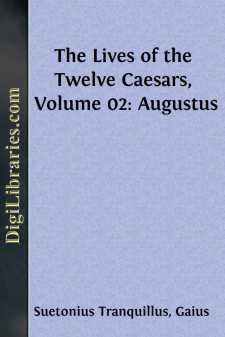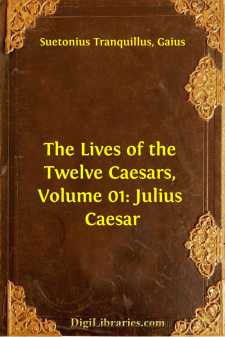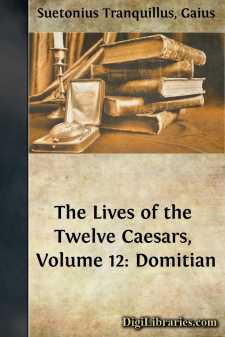Categories
- Antiques & Collectibles 13
- Architecture 36
- Art 48
- Bibles 22
- Biography & Autobiography 813
- Body, Mind & Spirit 142
- Business & Economics 28
- Children's Books 15
- Children's Fiction 12
- Computers 4
- Cooking 94
- Crafts & Hobbies 4
- Drama 346
- Education 46
- Family & Relationships 57
- Fiction 11829
- Games 19
- Gardening 17
- Health & Fitness 34
- History 1377
- House & Home 1
- Humor 147
- Juvenile Fiction 1873
- Juvenile Nonfiction 202
- Language Arts & Disciplines 88
- Law 16
- Literary Collections 686
- Literary Criticism 179
- Mathematics 13
- Medical 41
- Music 40
- Nature 179
- Non-Classifiable 1768
- Performing Arts 7
- Periodicals 1453
- Philosophy 64
- Photography 2
- Poetry 896
- Political Science 203
- Psychology 42
- Reference 154
- Religion 513
- Science 126
- Self-Help 84
- Social Science 81
- Sports & Recreation 34
- Study Aids 3
- Technology & Engineering 59
- Transportation 23
- Travel 463
- True Crime 29
The Lives of the Twelve Caesars, Volume 08: Otho
Description:
Excerpt
A. SALVIUS OTHO.
(416)
I. The ancestors of Otho were originally of the town of Ferentum, of an ancient and honourable family, and, indeed, one of the most considerable in Etruria. His grandfather, M. Salvius Otho (whose father was a Roman knight, but his mother of mean extraction, for it is not certain whether she was free-born), by the favour of Livia Augusta, in whose house he had his education, was made a senator, but never rose higher than the praetorship. His father, Lucius Otho, was by the mother's side nobly descended, allied to several great families, and so dearly beloved by Tiberius, and so much resembled him in his features, that most people believed Tiberius was his father. He behaved with great strictness and severity, not only in the city offices, but in the pro-consulship of Africa, and some extraordinary commands in the army. He had the courage to punish with death some soldiers in Illyricum, who, in the disturbance attempted by Camillus, upon changing their minds, had put their generals to the sword, as promoters of that insurrection against Claudius. He ordered the execution to take place in the front of the camp [670], and under his own eyes; though he knew they had been advanced to higher ranks in the army by Claudius, on that very account. By this action he acquired fame, but lessened his favour at court; which, however, he soon recovered, by discovering to Claudius a design upon his life, carried on by a Roman knight [671], and which he had learnt from some of his slaves. For the senate ordered a statue of him to be erected in the palace; an honour which had been conferred but upon very few before him. And Claudius advanced him to the dignity of a patrician, commending him, at the same time, in the highest terms, and concluding with these words: "A man, than whom I don't so (417) much as wish to have children that should be better." He had two sons by a very noble woman, Albia Terentia, namely; Lucius Titianus, and a younger called Marcus, who had the same cognomen as himself. He had also a daughter, whom he contracted to Drusus, Germanicus's son, before she was of marriageable age.
II. The emperor Otho was born upon the fourth of the calends of May [28th April], in the consulship of Camillus Aruntius and Domitius Aenobarbus [672]. He was from his earliest youth so riotous and wild, that he was often severely scourged by his father. He was said to run about in the night-time, and seize upon any one he met, who was either drunk or too feeble to make resistance, and toss him in a blanket [673]. After his father's death, to make his court the more effectually to a freedwoman about the palace, who was in great favour, he pretended to be in love with her, though she was old, and almost decrepit. Having by her means got into Nero's good graces, he soon became one of the principal favourites, by the congeniality of his disposition to that of the emperor or, as some say, by the reciprocal practice of mutual pollution. He had so great a sway at court, that when a man of consular rank was condemned for bribery, having tampered with him for a large sum of money, to procure his pardon; before he had quite effected it, he scrupled not to introduce him into the senate, to return his thanks....


